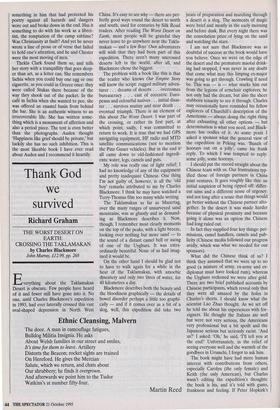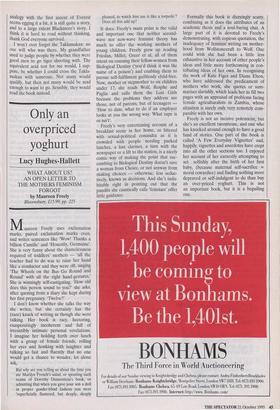Thank God we survived
Richard Graham
THE WORST DESERT ON EARTH: CROSSING THE TAKLAMAKAN by Charles Blackmore John Murray, f12.99, pp. 268 E verything about the Taklamakan Desert is obscure. Few people have heard of it and fewer still have gone into it. No one, until Charles Blackmore's expedition in 1993, had ever laterally crossed this vast oval-shaped depression in North West China. It's easy to see why — there are per- fectly good ways round the desert to north and south, used for centuries by Silk Road traders. After reading The Worst Desert on Earth, most people will be grateful they never leave to go anywhere near the Talda- makan — and a few Boys' Own adventurers will wish that they had been part of this expedition. There aren't many uncrossed deserts left in the world, after all, and Blackmore chose the biggest.
The problem with a book like this is that the reader who knows Our Empire Story will know the script: rugged military adven- turer . . . dreams of deserts . . . 'overcomes bureaucracy . . . cast of eccentric Euro- peans and colourful natives . . . initial disas- ter . . . survives mutiny and near death . . . eventual triumph. There is an element of this about The Worst Desert. I was part of the crossing, or rather its first part, at which point, sadly, I was committed to return to work. It is true that we had GPS navigating equipment, HF radio and MTD satellite communications (not to mention the Pinz Gauer vehicles). But in the end it' all came down to old-fashioned ingredi- ents: water, legs, camels and guts.
My role was really one of light relief; I had no knowledge of any of the equipment and pretty inadequate Chinese. One thing I'm not guilty of, however, is all the 'old boy' remarks attributed to me by Charles Blackmore. I think he may have watched a Terry-Thomas film too many while writing.
The Taklamakan as far as Mazertag, over the many ranges of unsurveyed sand mountains, was as ghastly and as demand- ing as Blackmore describes it. Now, though, I remember most clearly moments on the top of the peaks, with a light breeze, looking over nothing but more sand — to the sound of a distant camel bell or asong of one of the Uyghurs. It was extra- ordinarily beautiful. None of us had imag- ined it would be.
On the other hand I should be glad not to have to walk again for a while in the heat of the Taldamakan, with amoebic dysentery and only two litres of water, for 40 kilometres a day.
Blackmore describes both the beauty and the bloodiness graphically — the details of bowel disorder perhaps a little too graphi- cally — and if it comes over as a bit of a slog, well, this expedition did take two years of preparation and marching through a desert is a slog. The moments of magic were brief and mostly in the early morning and before dusk. But every night there was the consolation prize of lying on the sand and watching the stars.
I am not sure that Blackmore was as doubtful of success as the book would have you believe. Once we were on the edge of the desert and the premature maotai drink- ing had stopped, I was never in any doubt that come what may this limping ex-major was going to get through. Crawling if need be. This was — is — what marks him out from the legions of armchair explorers; he not only had the dream, but also the sheer stubborn tenacity to see it through. Charles may occasionally have reminded his fellow explorers of Churchill's description of the Americans — always doing the right thing after exhausting all other options — but determination is what you need, and Black- more has oodles of it. At some point I asked a sponsor what the general view of the expedition in Peking was. 'Bunch of hoorays out on a jolly', came his frank reply. To which I was tempted to reply: some jolly, some hoorays.
I should put the record straight about the Chinese team with us. Our frustrations typ- ified those of foreign partners in China joint ventures. It goes roughly like this: an initial suspicion of being ripped off: differ- ent aims and a different sense of urgency: and not long after a sense that things would go better without the Chinese partner alto- gether. In the desert it was made harder because of physical proximity and because going it alone was an option the Chinese had long ruled out.
In fact they supplied four key things: per- missions, camel handlers, camels and pub- licity (Chinese media followed our progress avidly, which was what we needed for our sponsors).
What did the Chinese think of us? I think they assumed that we were up to no good (a mixture of army, ex-army and ex- diplomat must have looked rum), whereas the Uyghurs reckoned we were after gold. There are two brief published accounts by Chinese participants, which reveal only that they were all amazed by the holes in Charles's shorts. I should know what the scientist Lao Zhao thought. As we set off he told me about his experiences with for- eigners. He thought the Italians ate well but were not very serious, the Americans very professional but a bit spoilt and the Japanese serious but seriously racist. 'And us?' I asked: 'Oh,' he said, 'I'll tell you at the end!' Unfortunately, in the relief of seeing everyone well and the warmth of the goodbyes in Urumchi, I forgot to ask him.
The book might have had more human interest with contributions from others, especially Carolyn (.the only female) and Keith (the only American), but Charles wasn't editing the expedition's thoughts: the book is his, and it's told with gusto, frankness and feeling. If Peter Hopkirk's analogy with the first ascent of Everest seems egging it a bit, it is still quite a story, and to a large extent Blackmore's story. I think it is hard to read without thinking, thank God everyone survived. I won't ever forget the Taldamakan: no one will who was there. My grandfather used to judge people by whether they were good men to go tiger shooting with. The equivalent acid test for me would, I sup- pose, be whether I could cross the Takla- makan with someone. Not many would qualify, but then not many would be mad enough to want to go. Sensibly, they would read the book instead.











































































 Previous page
Previous page